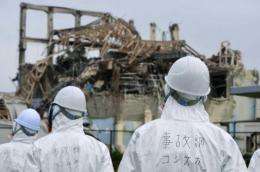Japan suspends waste water nuclear operation

Tokyo Electric Power Co. Saturday halted an operation to clean highly contaminated waste water at a crippled Japanese nuclear plant due to higher-than-expected radiation levels.
The embattled operator of the stricken Fukushima Daiichi facility said it had suspended the procedure just hours after it started because a new part was needed, adding that it did not know when it would resume.
Part of the system that absorbs radioactive caesium had reached its processing capacity and needed to be replaced far earlier than expected, TEPCO officials said.
The operation started at 8:00 pm Friday (1100 GMT) and was stopped five hours later, said TEPCO, which had earlier expected the part to last for one month.
"We are studying the cause of this," said Junichi Matsumoto, TEPCO official in charge of nuclear operations.
TEPCO officials speculated that highly radioactive mud might have entered the treatment system or that waste water was more radioactive than previously measured.
"We do not have a firm timing as to when we can resume the operation of the water treatment facility," Matsumoto told a news conference.
TEPCO has struggled to cool overheating reactors at the plant, hit by a 9.0 magnitude earthquake and deadly tsunami on March 11.
The wave knocked out reactor cooling systems and backup generators, sparking meltdowns, explosions and radiation leaks.
The world's worst nuclear accident since Chernobyl in 1986 has caused radioactive material to spew into the air, ground and sea and forced the evacuation of 80,000 people in a 20-kilometre (12-mile) radius.
Workers have pumped water into reactor cores and fuel rod pools, leaving more than 100,000 tonnes of contaminated water in basements, drains and ditches, some of which has leaked into the ocean.
The water must be decontaminated before it can be stored or recycled back through the reactors to cool them.
Pumping out the highly radioactive water should then allow workers to start longer-term repair work to the cooling systems.
Meanwhile, the industry minister said other nuclear power reactors, which were temporarily taken offline for inspections and to install additional safety measures, were safe to operate.
Banri Kaieda said nuclear reactors were necessary to provide enough electricity to power industries and households.
"If the nuclear power plants are not able to operate even with the (additional) safety measures, it could cause industries to stagnate and increase the worries in the lives of the Japanese people," Kaieda told reporters.
"I ask for cooperation from residents of local communities," he said.
Kaieda needs the agreement of local governments to bring reactors online and it was not clear how communities hosting the nuclear plants would respond to his appeal.
Of Japan's 54 commercial nuclear reactors, 17 are currently operating, the ministry said. Two other units are in test operation but offline.
The remaining 35 reactors, including six at the crippled Fukushima Daiichi nuclear plant, have remained shutdown due to quake damage or routine inspections, according to local media.
Resource-poor Japan generates about 30 percent of its power from nuclear plants.
The centre-left government of Prime Minister Naoto Kan has announced a major energy policy review that would promote solar and other alternative energies.
(c) 2011 AFP




















